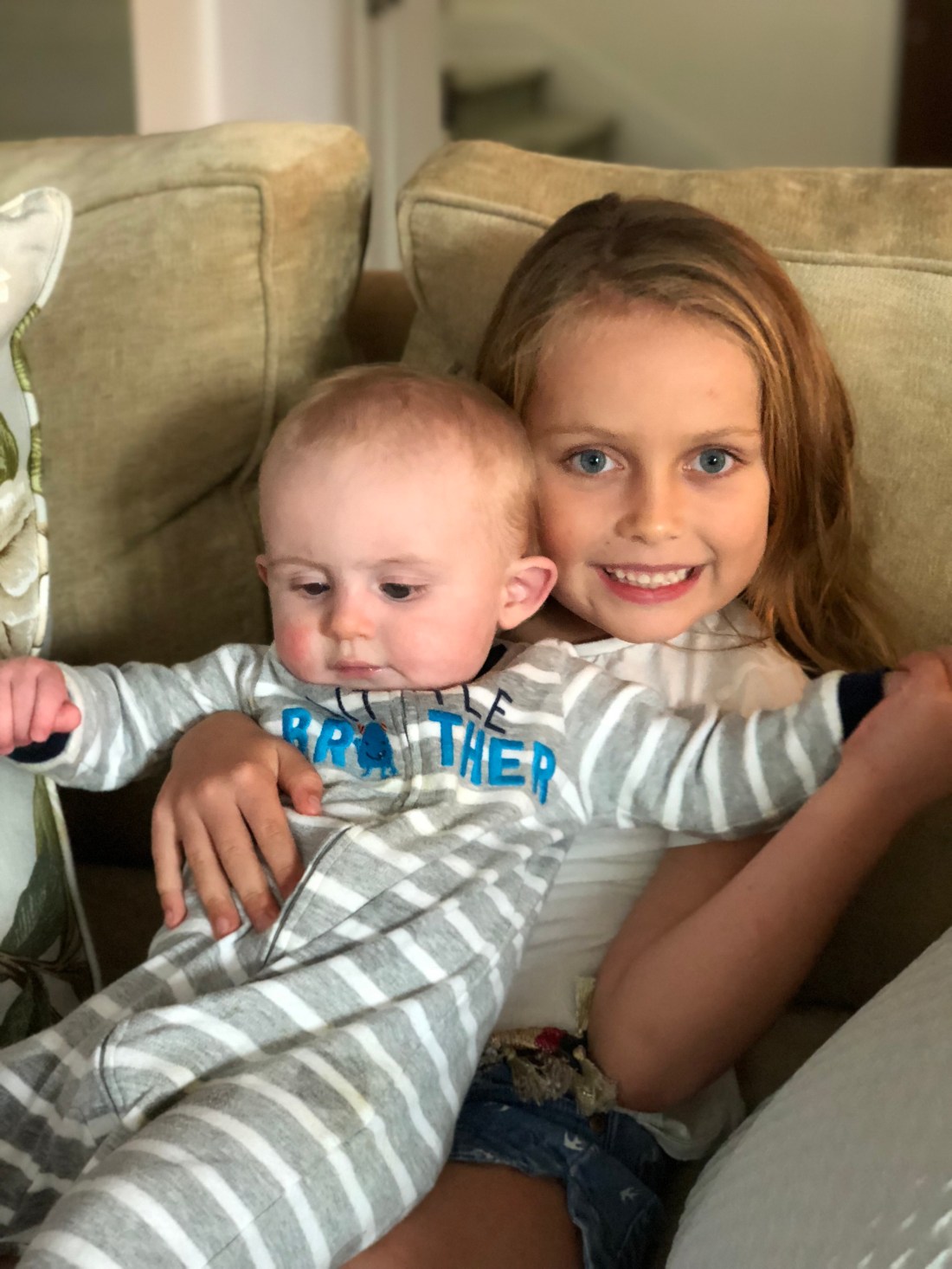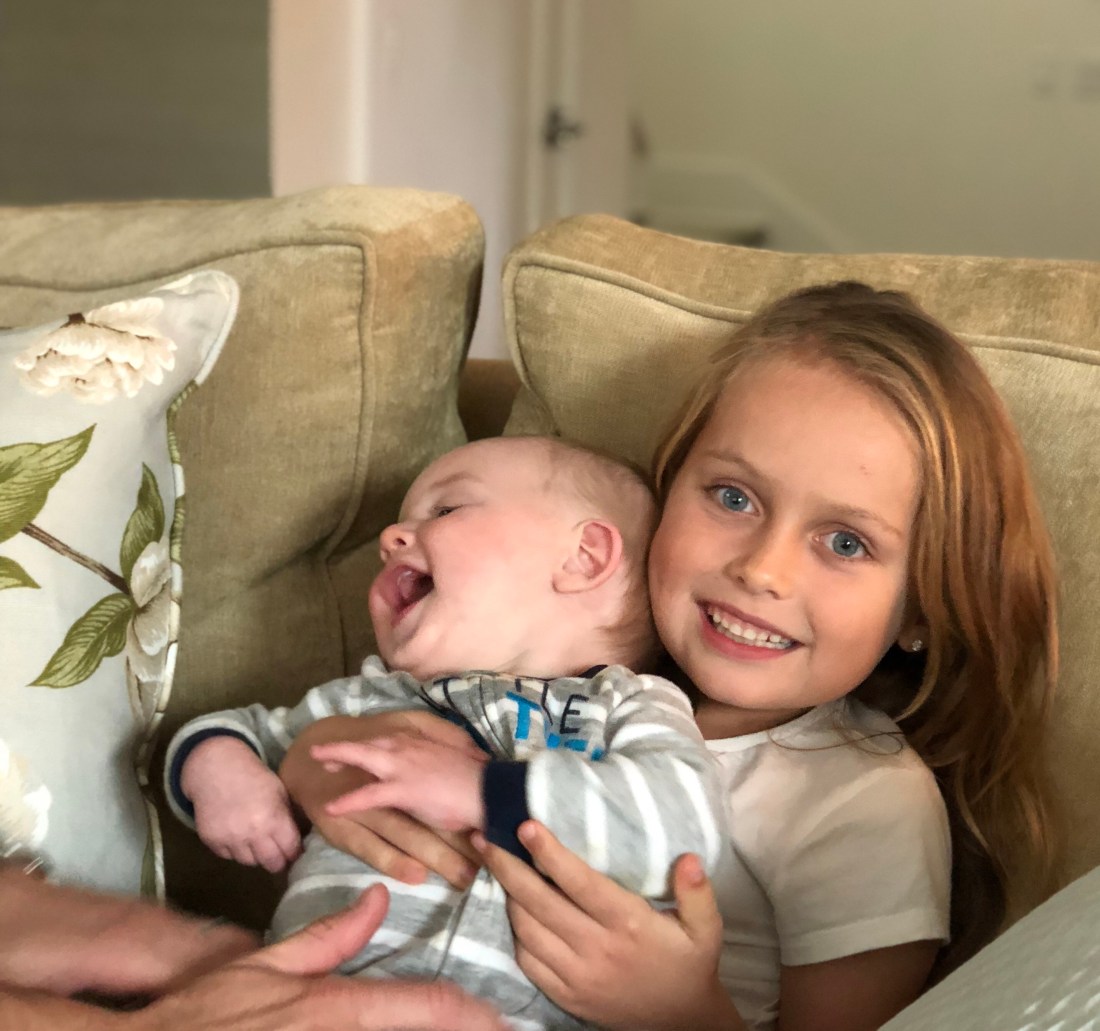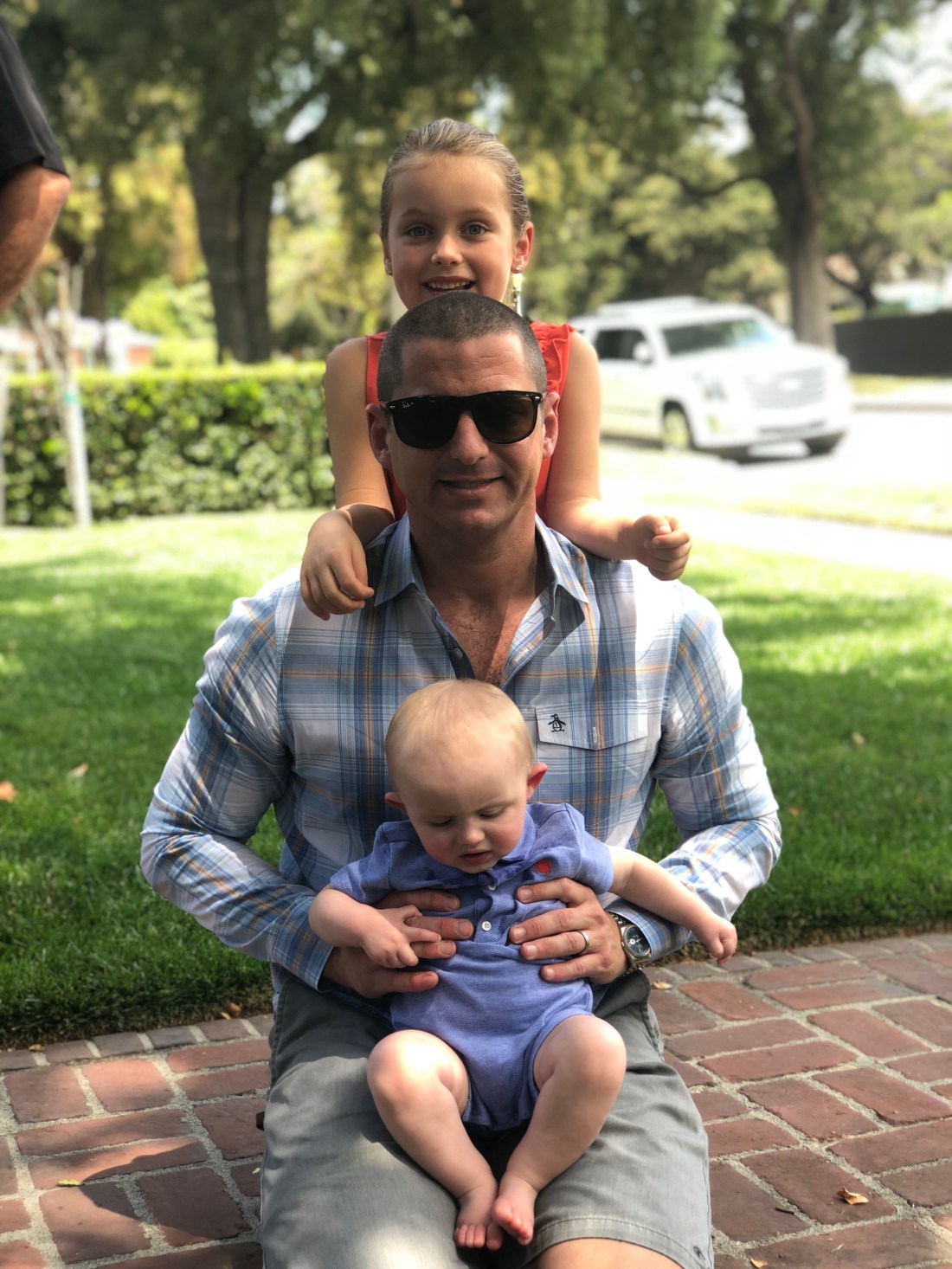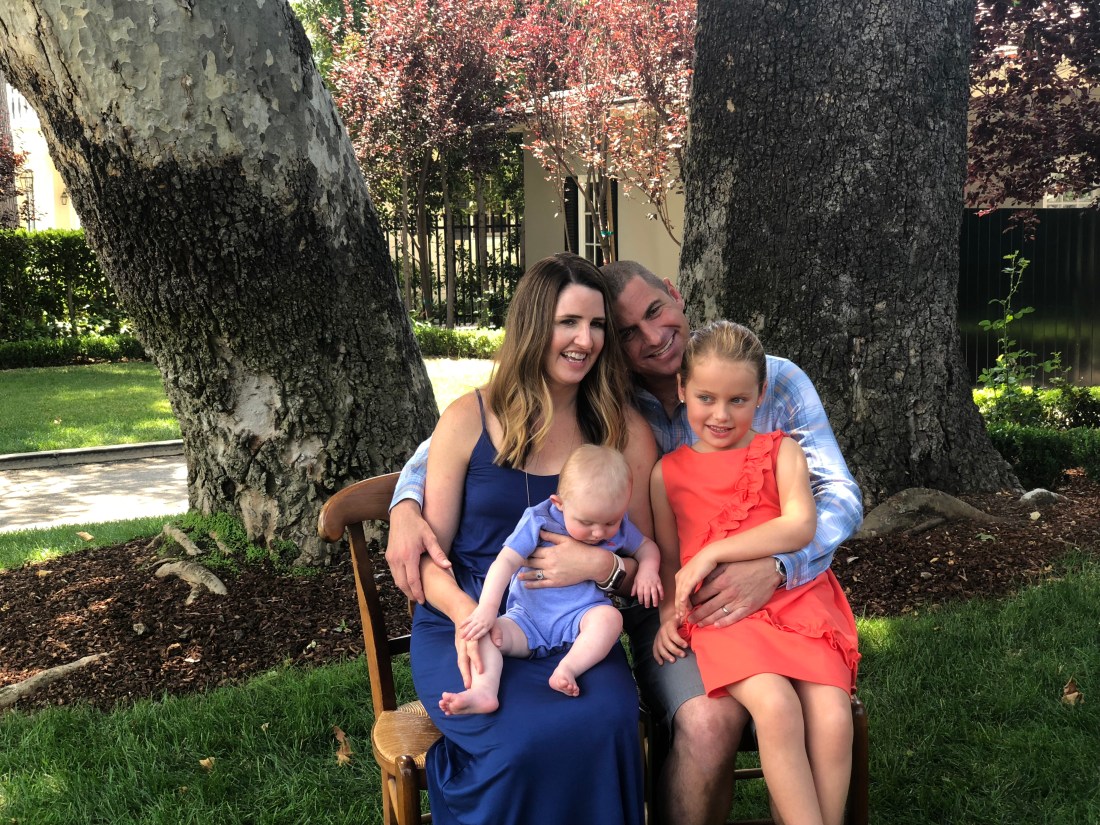Finn has a big sister, Ariella, an amazing, spirited 6-year-old who is Patrick’s daughter from a previous relationship. She unfortunately lives all the way around the world in Australia which is why she is not a part of Finn’s, or our, day-to-day life, but she is very much an integrated part of our life and his. Our process to acceptance of the physical distance from, and my husband’s relentless efforts to ensure emotional closeness to, his daughter could certainly be its own blog topic. I introduce her in this blog now because she didn’t get to meet her baby brother for the first time until he was 9 months old. Patrick visits his daughter every three months, but she has only been able to visit us in the US a few times now.
When I found out I was pregnant with Finn, Patrick told Ariella during one of his visits that year by presenting her with a t-shirt that read “I’m going to be a big sister.” She was immediately thrilled and squealed, and only mildly disappointed when she heard it was a boy and not the sister she told us she preferred. After Finn’s birth and subsequent (non) diagnosis, Patrick had to explain to Ariella that her baby brother could not and would not be able to see her. He explained that Finn was born with essentially broken eyes for lack of a better word. We braced ourselves for the conversation and the questions that might follow. Her reaction: “Oh, OK. But he can hear me and touch me?” Patrick: “Yes, honey, he can hear you and feel you.” Ariella: “OK.” And off she went to color a unicorn. She was unfazed.
Over the course of the next few months Ariella would always ask to see and talk to “Finny” during our weekly FaceTime dates. Sometimes she would yell when talking to him, seeming to confuse blindness and deafness, which always made us laugh, but she never really asked a lot of questions about his blindness and treated him just as any big sister would her little brother.
Last July, Ariella’s mother made the trek to bring her to meet her brother for the first time. We met them in Los Angeles where Patrick’s family all live to make the journey easier on them, and to give both Ariella and Finn time with their grandparents, aunts and uncles, and cousins. We were all beside ourselves with excitement and yet I carried a little anxiousness with me about how Ariella would react to her brother in person, and he her. Would she have a million questions about his blindness that we weren’t prepared to answer? Would she think his eyes looked weird? Would she find it hard to connect with him since he couldn’t see her toys or books and find that frustrating? Would they bond? Would he recognize her voice or treat her as a stranger and cry, hurting her feelings? Of course, my anxiety was all for not. Their bond was immediate and so touching that both Patrick and I couldn’t help but cry tears of joy. We spent a week together as a family and it was thus far the happiest week of my life – probably will remain so until the next one we have together. I watched Ariella with her little brother and she was so enamored with him. She even proposed marriage to him with a flower by the end of the trip. She seemed instinctively to know exactly how to be with him – to touch him to create a connection, to narrate to him what she was doing, to soften her voice when he became overwhelmed by all the noise. She did ask if Finn would ever be able to see her, a fair and natural one to ask. When given the answer most likely not, she was OK with it. She just wanted to know.
Over the course of the last year and a half in telling people about Finn, or introducing people to Finn, we’ve encountered a gamut of reactions. One of the earliest was an older nurse at our surgeon’s office who was entering medical information about Finn in the computer as we answered them, and then proceeded to burst into tears and tell us how sorry she was. At first thought I appreciated her sympathy for our situation as I was feeling pretty sorry for myself those days too, but soon thereafter I realized how wrong of her it was to impose feelings of sadness and tragedy on my child for the way he was born, not to mention extremely unprofessional. A pharmacist at Walgreens had a similar reaction when I went to pick up Finn’s prescription for eye drops after his first surgery, “Oh my God, and there’s nothing they can do?!?! I’m so sorry and will pray for him!” On our trip to Los Angeles to see Ariella a cashier at the grocery store blurted out to Patrick, “What’s wrong with his eyes??”
Tears and prayers have been the most common reaction alongside a now instantly recognizable pity face. On the other end of the spectrum have been those who barely react at all. Perhaps they just don’t know what to say and don’t want to make us or themselves uncomfortable so they move on to another topic as if I’ve just said my son has a hangnail. Somewhere in the middle is the best reaction, in my opinion – that of interest in who my son is, but not an assumption that his life and ours must be tragic. I ran into an old friend at the airport not long ago and I was holding Finn. He was making silly faces at Finn expecting a reaction as most people do when encountering a baby so I explained that Finn is blind. His response: “Oh, I didn’t know, but he can certainly feel can’t he!” And he proceeded to lightly caress Finn’s arm and talk to him. There was no pity. There was no shock even. Just a natural adjustment in his own interaction with my son in order to connect. It reminded me a lot of Ariella’s first reaction and interactions with her little brother.
I’m rarely, if ever, offended by any reaction within this range (well maybe a little by that cashier). It has always been my philosophy to judge people on their intentions above anything else. If someone wants to cry for my son, pray for my son, or ask a million, sometimes inappropriate, questions about his eyes, I know that almost always comes from the best of intentions and just a lack of experience with encountering a blind child. But reactions can have a real impact if given at a vulnerable time, just as that nurse immediately made me feel sadder and that pharmacist immediately made me feel more hopeless.
My job as Finn’s mother is to protect him, and as he gets older and can comprehend these reactions himself I feel very anxious about how he might be affected. Finn doesn’t need to be told that someone is praying for his vision to be restored – this could lead him to falsely believe that he is inadequate, or that some miracle is out there to give him this thing called vision that he has never known, yet everyone else seems to think he needs to live a full life. I’m sure many might disagree, but Patrick and I are not interested in giving Finn false hope, leading him to live a life where he’s constantly chasing or wishing for a different life than that he was born with. In a way, it would be like us telling a child who was born short in height to pray for a miracle or medical/technological advancement in the future to make him tall. That’s just silly and there’s nothing wrong with being short!
Finn doesn’t need sympathy or someone crying to him over his blindness – this could make him feel that there’s a reason to feel sad or that he’s lost something that he’s never even had. Finn is the farthest thing from sad (unless you tell him it’s nap time) and I want him to stay that way.
Finn doesn’t need someone ignoring him simply because they don’t know what questions are appropriate to ask or how to approach him without startling him – this could lead to his feeling isolated and outcast. I want my son to be approached and included just as any other child would be on the playground, at school, in the grocery store, at work, in life.
Finn just needs to be treated like anyone else with just a few slight adaptations on their part, not his, to connect. For example, when I encounter a blind person I always say “Hi, I’m Alison, and I’m reaching out to shake your hand.” The first time I did this I was nervous, but that was my own insecurity and issue, not his. This person turned out to be one of the most fascinating people I’ve ever met so it would have been my loss if I’d taken the easy route of ignoring him instead.
I write this post to encourage us all to act a little more like Ariella, or like my friend at the airport, when we come across those who may be disabled, different from ourselves, or fill in the blank. Be unfazed, be kind, be interested, be inclusive and be yourself! I’m willing to bet we’ll all be glad we did.








Alison, You are my inspiration and thank you for your current “blog “. You have gifted us with your writing . Love Dottie
Sent from my iPhone
>
LikeLiked by 1 person
Another truly eloquent post, Al. You and Patrick are indeed an inspiration. Love, Dad
LikeLiked by 1 person
Thanks Alison. This helps all of us. Keep the blogs coming we get to know Finn better. Happy valentine’s Day .💕💕💕💕
LikeLiked by 1 person
Thank you for sharing your world and educating us. The Mana Bear instinct is a strong one. Finn is blessed to have you as his Mom.
LikeLiked by 1 person
So beautifully written and thought provoking. I love the unfiltered take on life that little people have. So much to learn from it. I also love hearing about you and Pat and what’s happening in your lives. We so hope the stars will align so that we can get our clans together one day soon x
LikeLiked by 1 person
I missed this blog post earlier, Alison, and wanted to tell you again how impressed I am with the way you can convey your thoughts in writing! And how informative this post is! The photos of all 4 of you are wonderful, but the ones of Ariella and Finn truly touch my heart! What a beautiful family you and Patrick have! Love to all of you. Edith
LikeLiked by 1 person